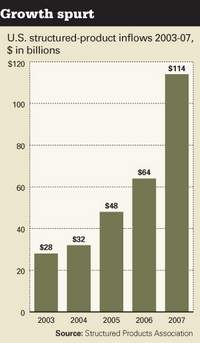by Oliver Ralph, Investors Chronicle (UK)
There's little consensus about what the stock market will do in 2009. For some, the pre-Christmas rally was a pause for breath in the longer bear trend. For others, we've reached the bottom already. So are structured products, which offer a combination of capital protection and exposure to upwards movements in the stock market, the ideal choice?
YES, says Nick Lee, sales manager, NDFA:
"When is the recovery going to start? Will we see further substantial falls? There’s a good chance but of course I may be wrong. So what can structured products offer that other funds cannot?
Simplicity. They do what they say on the tin. They don’t "aim to" or "target" a return. They offer a clearly defined return with a known level of risk. They are also much cheaper than most funds – typically 6 per cent in total over a 5 year term compared to possibly 5 per cent upfront and 1.5 per cent per year using funds, totalling 12.5 per cent over the same period.
I suspect a number of investment commentators will take issue with me. I’m writing this having read a Sunday paper money section which was dotted with the usual negative comments regarding structured products: "With these products you are limiting your upside and with the market where it is arguably this is the worst time to buy a guarantee". This referred to a product which offered five times the first 20 per cent of any rise in the FTSE capped at 100 per cent growth. I would suggest that any investor would be delighted with a 100 per cent return. It also limited any losses unless the FTSE fell by more than 50 per cent, at which point you are exposed to market risk. Experienced fund managers will charge a lot more than the structured product with full market risk from the outset. How many will outperform the market by five times?
Another ill informed gem: "The main point of the marketing spin on structured products is that you can have the return without the risk". We lay out the potential returns along with the potential risk, yet I am dumbfounded that so called financial advisers take so little time to look at how these work, therefore depriving investors of what are some of the best value opportunities available.
I firmly believe structured products are as good a way to be prepared for a recovery as any other fund."
NO, says Richard Saunders, chief executive, Investment Management Association
"Many structured products offer you a guarantee that you will underperform cash when the markets go down and underperform equities when the market goes up. So, if you think a recovery is coming, why on earth would you want to be in something that is guaranteed to underperform?
Not all structured products fit that description of course. But they all cater to the natural human wish to earn a decent return without running risk. That is certainly something that would be very nice right now, with interest rates plunging towards zero, house prices continuing to fall, and hugely volatile equity markets.
But hard experience shows that reward without risk is a chimera. If you do not want to take risk you should stick to low risk assets, even if the yield is unattractive. And if your time horizons are long enough, you can afford to invest in higher risk assets.
Structured products seek to offer the best of both worlds. A common product is the Guaranteed Equity Bond (GEB), which offers participation in the growth of an index, together with a money-back guarantee. IMA’s analysis of returns on maturing NS&I GEBs suggests that they have in rising markets underperformed index tracking funds by 3-4 per cent a year. This is of course more or less what many people think is the equity risk premium. In other words, over time they seem to be delivering only a risk-free return. But they do not even achieve that when markets decline.
The more sophisticated products, offering a set return provided certain conditions are met, may be attractive to those seeking absolute return. But they are not a way to take advantage of a rising market. And as many investors have discovered to their cost in the wake of the Lehmans failure, they introduce a completely new set of counterparty risks that many did not realise they were running.
I do not know when the bear market will end. But once you’ve called it, an equity fund is surely the logical way to back your judgement."
To access the original article from Investors Chronicle, click here.
Thursday, January 1, 2009
Subscribe to:
Post Comments (Atom)



1 comment:
That's really great news, and very informative and useful, Thanks for giving such information and blog.
Agenzie modelle milano
Post a Comment